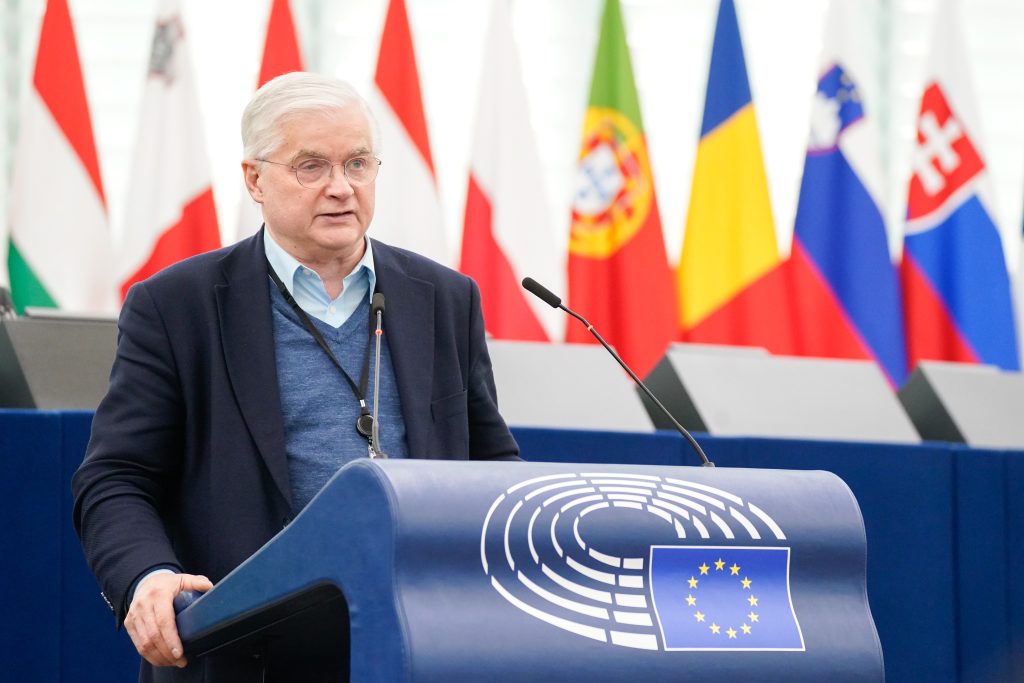
Włodzimierz Cimoszewicz: Europe must seize Russia’s state assets now
2024-01-26 | Political initiatives, Asset confiscationWłodzimierz Cimoszewicz is a member of the European Parliament, and a former prime minister and foreign minister of Poland.
Rarely are the moral, legal, political and economic arguments for action as strong as in the case for confiscating Russia’s state assets to fund Ukraine’s recovery and reconstruction — now at over €400 billion and growing rapidly.
However, recently, far too much time and political capital has been spent on the separate issue of taxing profits from Russia’s underlying state assets, €200 billion of which is deposited at Euroclear — a financial pipeline based in Brussels.
Euroclear is an intermediary, transferring funds from one depository to another, and normally it wouldn’t hold these assets — it didn’t before the outbreak of the full-scale invasion. But now awash with cash, Euroclear’s position is that this wartime profit — around a hefty €4 billion in 2023 — is its own private property.
Euroclear’s narrow commercial interest in keeping this blood money cannot stand. But in any event, this is a sideshow. Europe needs to seize not just the profits from but all of Russia’s underlying assets — and it must do so now.
Morally, everyone agrees that Russia must pay for the death and destruction it has visited on Ukraine. The United Nations General Assembly has held unambiguously that Russia “must bear the legal consequences” for its war of aggression, including reparations.
There has also been a lot of legal analysis arriving at the same conclusion we reached in the European Parliament a couple of months ago: Russia must pay now.
In October, the Parliament accepted an amendment of mine to the Ukraine Facility, unequivocally stating that confiscating Russia’s public assets is justified “under customary international law, either as a collective countermeasure in response to Russia’s violation of the fundamental rule prohibiting wars of aggression or as an act of collective self-defense under Article 51 of the UN Charter.”
Likewise, the Foreign Affairs Committee of the United States House of Representatives approved a proposed bill authorizing the confiscation of Russian state assets. And Canadian law already permits the seizure of public assets.
As a practitioner of international law, let me unpack the basic logic underpinning these conclusions — at least in Europe.
First, in the absence of a world government, legislature and court, states often need to resort to individual and collective self-help to secure their rights. Ukraine, for instance, cannot rely on the U.N. to protect it and is defending its territory with its own brave citizens on the battlefield, as well as extensive help from its Western partners. Thus, even though the predominant damage has occurred in Ukraine, the European Union has incurred extensive costs as well.
Second, as a matter of international custom, states can suspend duties owed to another country — such as the immunity of sovereign assets — in order to compel compliance with their obligations. That’s how the international legal system works in practice — otherwise, aggressors would be shielded by interpretations of international law, which would only add insult to injury for the victims.
The same logic applies to collective self-defense. Thus, Europe can freeze Russia’s private and public assets, impose 12 rounds of sanctions and establish travel bans. Thus, it can train tens of thousands of Ukrainians for the front lines and provide billions of euros in weapons supplies. Indeed, the Parliament invoked collective self-defense only a few days after Russia’s full-scale invasion, calling on EU member countries to provide Ukraine with the military support it needs to prevail.
From a political perspective, the time to seize these assets is also now — not in some distant future as part of peace negotiations. The brutal reality of modern conflict is that it can drag on for years, without a total victory by either side or the ability to dictate terms. And if we wait, we’re unlikely to ever seize these assets, which is why we should do so immediately, as part of EU’s overall strategy to squeeze Russia’s economy and military machine.
Meanwhile, economically speaking, the critique sometimes offered against confiscating state assets is that doing so would disrupt financial markets and lead to the withdrawal of assets by countries like China. But where would these assets go? The vast majority of central bank reserves are in Western capitals, as it makes economic sense for these countries in terms of managing their international transactions. And would China really withdraw its assets? Wouldn’t that signal that it might be considering its own war of aggression?
In essence, if the EU and the G7 were to move together on this issue, they could forestall any real economic disruptions.
Finally, let us also consider the consequences of the failure to seize these assets. We’ve been primarily talking about the reconstruction of Ukraine but, given the increasing difficulty of securing Western financial support in the context of a prolonged conflict, Ukraine may simply run out of money to sustain its defensive effort. Plus, the postwar picture will look equally grim — a destroyed economy and infrastructure, hundreds of thousands of veterans struggling to find jobs and reintegrate into society amid a general sense of abandonment. Europe needs to anticipate the potential political consequences for all.
If it is to provide Ukraine the resources it needs, Europe must confiscate Russia’s state assets now. And for all the talk of strategic autonomy in recent years, it would be ironic if even on an issue like this — where the assets are located in Europe and the EU could very well seize them — nothing happened until the U.S. made a move.
Europe must grab this opportunity and show leadership by finally flexing its geo-economic muscle.
Originally published on Politico.
